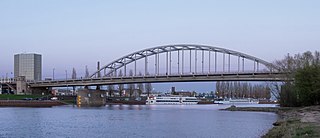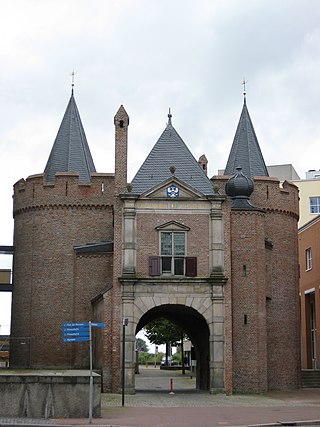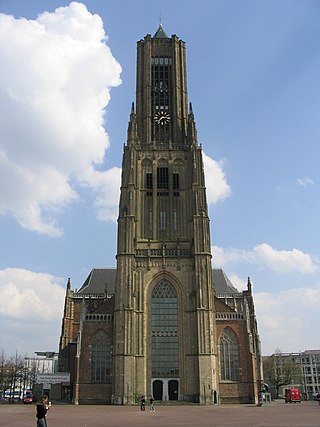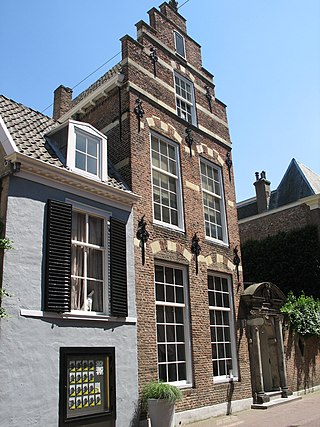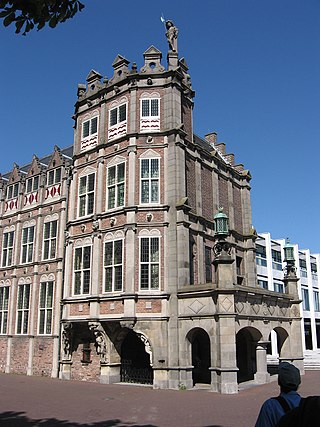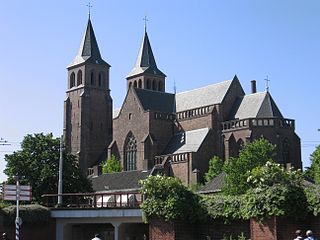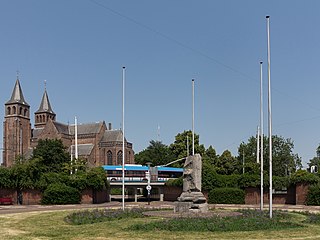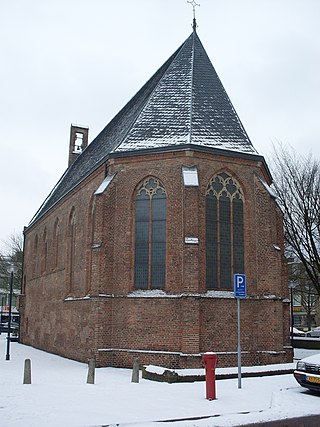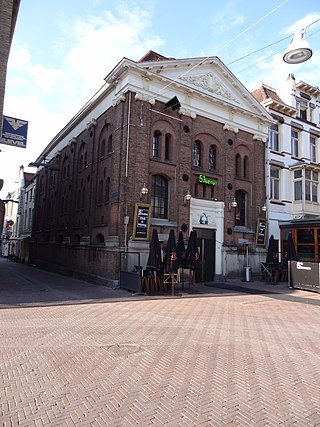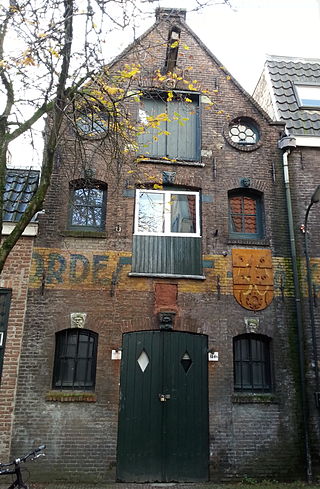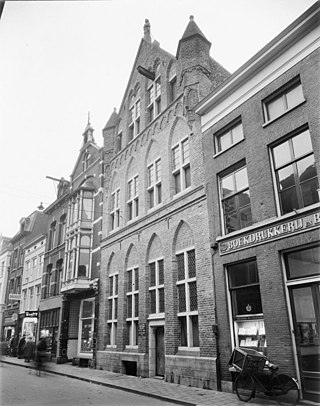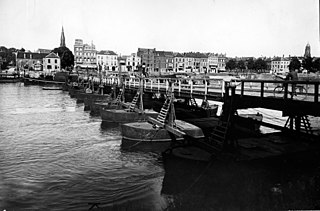Self-guided Sightseeing Tour #2 in Arnhem, Netherlands
Legend
Tour Facts
4.7 km
57 m
Experience Arnhem in Netherlands in a whole new way with our free self-guided sightseeing tour. This site not only offers you practical information and insider tips, but also a rich variety of activities and sights you shouldn't miss. Whether you love art and culture, want to explore historical sites or simply want to experience the vibrant atmosphere of a lively city - you'll find everything you need for your personal adventure here.
Activities in ArnhemIndividual Sights in ArnhemSight 1: John Frost Bridge
Get Ticket*John Frost Bridge is the road bridge over the Lower Rhine at Arnhem, in the Netherlands. The bridge was inaugurated after the end of World War II, and is named after Major-General John Dutton Frost (1912–1993), who commanded the British forces that reached and temporarily defended the pre-existing Rijnbrug at the same location during the Battle of Arnhem in September 1944. This was the bridge referenced in the 1977 Anglo-American film A Bridge Too Far, although the IJssel bridge in Deventer was used for the actual shooting of the film.
Sight 2: Verzetsmonument Arnhem
The resistance monument in Arnhem is a monument in honour of the resistance in Arnhem, designed by the designer Jouke Hoogland and the poet Jos Pauw. From 2005 to 2015, the resistance monument adorned the rear façade of Musis Sacrum on Velperplein. In 2017, the monument was redesigned and relocated to the Rijnkade near the John Frost Bridge in the Jacob Groenewoudplantsoen.
Sight 3: Sabelspoort
The Sabelspoort is a city gate of Arnhem.
Sight 4: Sint-Eusebiuskerk
St. Eusebius church also known as the Eusebiuskerk or the Grote Kerk, at 93 metres is the largest church, and the largest building in Arnhem, The Netherlands.
Sight 5: Mens tegen macht
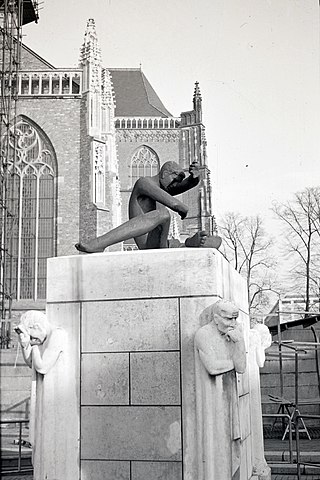
Man against power (1953) is a war memorial in the Dutch city of Arnhem by the sculptor Gijs Jacobs van den Hof.
Sight 6: Presickhaeffs Huys
The Presickhaeffs Huys is a medieval house in the center of Arnhem on the Kerkstraat, which according to research was built in the year 1354. In 1555 a T-shaped extension took place at the rear with a beautiful courtyard; from 1606 the Nassauch Widows' Home moved into the building. Then in 1795 it was a tea house and from 1915-1944 a café with meeting rooms. Partly due to the many destructions that were caused in the center of Arnhem during the Battle of Arnhem in the Second World War, this is one of the few medieval houses that Arnhem still possesses. The house, near St. Eusebius' Church, had its own courtyard. Previously, the house extended to the Koningstraat behind it. The building is a national monument.
Sight 7: Duivelshuis
The Devil's House or Maarten van Rossum House, on the Koningstraat in the center of the Gelderland capital Arnhem, is a city castle from the 16th century. It is called 'Devil's House' because of the satyr figures on the façade. The city castle houses the office of the mayor of Arnhem. After the Second World War, the cellars became a place of pilgrimage for veterans, relatives and other interested parties regarding the Battle of Arnhem.
Sight 8: Sint Walburgisbasiliek
St. Walburga's Church is the oldest surviving church in Arnhem. The building has a characteristic double tower front on the west side. The church is built on the Count's Court and the residence of Reinald 1.
Sight 9: Airborne monument
The Airborne Monument in the Dutch city of Arnhem is a monument on the Airborne Square in memory of the Battle of Arnhem in September 1944. It consists of a column of the former Palace of Justice in Arnhem that was damaged by the war and has been placed on a pedestal. During the battle of Arnhem in September 1944, the courthouse was completely destroyed. A fragment of one of the columns was preserved as a reminder of the war and now forms the monument. On 17 September 1945, the monument was unveiled by the Queen's Commissioner, mr. Schelto baron van Heemstra. On the column is the date in gilded letters: 17 September 1944.
Sight 10: Doopsgezinde Gemeente Arnhem
St Agnes Convent was a religious house of the Sisters of the Common Life in the city of Arnhem, in the Duchy of Guelders, in the 15th and 16th centuries.
Sight 11: Koepelkerk
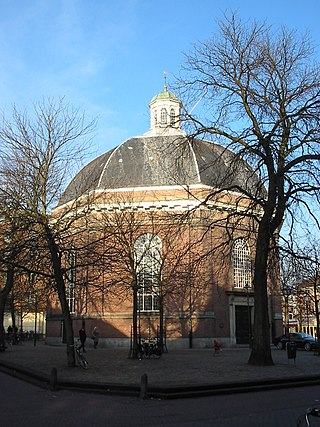
The Koepelkerk is a monumental church on Jansplein, in the center of Arnhem.
Sight 12: Lutherse Kerk
The Lutheran Church is a former Lutheran church building on the Korenmarkt in the Dutch city of Arnhem. The church was built on the site where the Bontenburch house had stood until then. In this house, which became increasingly dilapidated, Lutheran religious meetings had been held since 1657. In the period 1735 - 1737, the hall church was built in classicist architectural style according to the presumably design of the Arnhem architect Leendert Viervant the Elder. The façade is set up according to the Ionic architectural style with a large pediment at the top. It features decorations in the Louis XIV style. The capital rests on columns that have been imitated around the building. Above the entrance is an image of a swan as a sign of the Lutheran faith.
Sight 13: De Drie Haringen
The Three Herrings is the name of a medieval warehouse on the Rijnstraat in the Dutch city of Arnhem. The building was probably built by a member of the Cleaners' Guild. Guilds of that name carried a coat of arms that showed three pegs. The current façade dates from the beginning of the twentieth century, but contains seven older natural stone sculpted masks in the style of Hendrick de Keyser and a façade stone with three pegs. These culturally and historically valuable façade elements are registered as national monuments.
Sight 14: Sint-Petersgasthuis
The Sint Petersgasthuis is a former hospital in the Dutch city of Arnhem. The building was built around 1354 on the Rijnstraat and served as a residence and a mint in the first years. In 1407 the building was used as a guest house.
Sight 15: De Arnhemse Schipbrug
The Arnhem Ship Bridge was a pontoon bridge in Arnhem over the Lower Rhine. The ship bridge was located west of the city on the spot where the Nelson Mandela Bridge is located today. It provided the most important connection across the Rhine until the construction of the Rhine bridge in 1935.
Sight 16: Doorlaatbrug Eldensedijk
The Doorlaatbrug in the Eldensedijk is a bridge and movable flood defence in Arnhem, the Netherlands. The structure is no longer in use as a flood defence, and has the status of a national monument.
Share
Disclaimer Please be aware of your surroundings and do not enter private property. We are not liable for any damages that occur during the tours.
GPX-Download For navigation apps and GPS devices you can download the tour as a GPX file.
